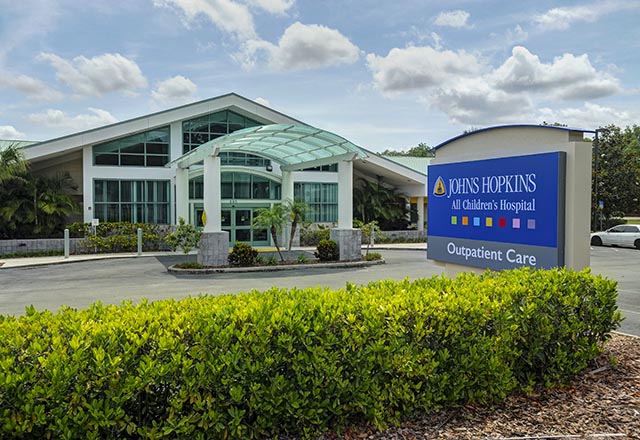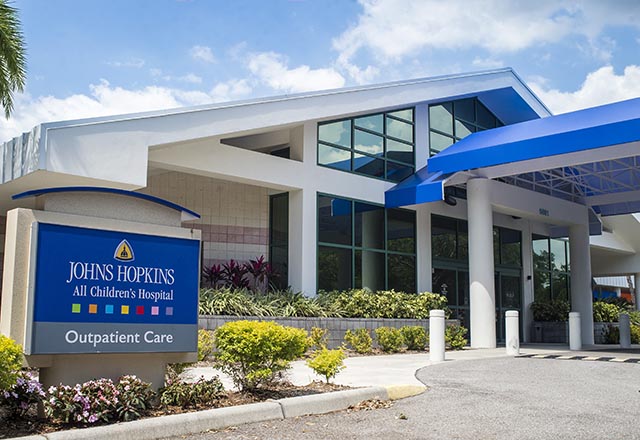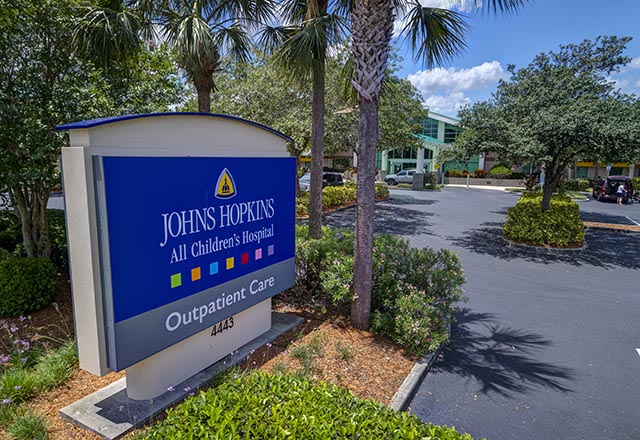Neonatal Follow-up Program
The program provides specialized care for premature and critically ill infants to address their individual developmental needs.
Premature and critically ill infants often have a host of complex medical problems that may impact their overall health and development, including growth and nutritional issues, developmental delays, and other disruptions to brain development that may lead to developmental delays.
The team in the Neonatal Follow-up Program at Johns Hopkins All Children’s Hospital focuses on achieving the best outcomes for these babies as they are discharged home, improving their growth, nutrition and neurodevelopmental outcomes.
The program also provides a forum for research and training for current and future medical providers.
Follow-Up Programs and Services
The Neonatal Follow-up Program cohorts refer to groups of babies with specific health issues. Grouping them allows for specialized, dedicated care for their health condition. These cohorts include:
Neonatal Abstinence Syndrome (NAS)
The national opioid epidemic is prevalent in Florida, where more than 1,100 babies were born in 2020 with exposure in the womb to addictive drugs or medicine, a condition known as Neonatal Abstinence Syndrome.
Thanks to generous philanthropy, our team is improving care and reducing length of stay in the hospital for babies with NAS through research and care coordination. With our approach, these newborns now require less medication and are successfully withdrawing from their dependency. As part of the continuum of care, we continue to monitor the short-term and long-term impact of drug exposure to these babies. Learn more about the NAS clinic.
Neurologic Conditions
Parents often share that their greatest worry is their baby might experience a brain injury before or during delivery. When this happens, it can lead to conditions such as:
- Hypoxic-ischemic encephalopathy (HIE), which can happen when the brain doesn’t receive enough oxygen or blood flow
- Intraventricular hemorrhage (IVH), or bleeding in or around the ventricles in the brain
- Intracranial hemorrhage (ICH), which happens when a ruptured blood vessel causes bleeding inside the brain
- Stroke
- Seizures
Through a multidisciplinary approach, the neonatal follow-up team works to support these babies to ensure optimal outcomes.
Extremely Low Birth Weight (ELBW) and Very Low Birth Weight (VLBW)
Babies who are born prematurely often are very small with low birth weights. Because these babies haven’t had time to fully develop, they typically face challenges such as breathing, feeding, growth and developmental issues. Our highly skilled and experienced team collaborates with additional specialists and primary care providers to ensure that even the tiniest babies get off to a successful start after they graduate from the NICU.
How often will my baby be evaluated after he or she is born?
Your baby’s evaluations will be based on his or her “corrected age.” Your baby’s corrected age is the age, minus the number of weeks they were born prematurely. So, for example, a 6-month-old baby who was born two months premature would have a corrected age of 4 months. Corrected age is also sometimes called adjusted age.
Babies born prematurely will develop at a different pace from babies born at term, so doctors use corrected age as part of their assessments when they are tracking your child’s developmental progress.
Babies in our neonatal follow-up program are followed using this schedule:
- 2-4 weeks after NICU discharge
- 4 months of corrected age
- 8 months of corrected age
- 18 months of corrected age
Our patients are also seen at 1 year of corrected age, and then annually up to age 5 for neurodevelopmental assessment.
Meet the Neonatal Follow-Up Team
The Neonatal Follow-up Program at Johns Hopkins All Children's includes a comprehensive, multidisciplinary team of medical providers skilled in NICU transitional care, occupational therapists, speech-language and feeding therapists, and neuropsychologists. These specialists help our patients achieve their full potential through ongoing growth and developmental evaluation and treatment.
Resources for Families
Early Steps
The Early Steps program provides early intervention and therapy services to help build a child’s strengths and teaches parents or caregivers activities to help their child learn and develop.
Women, Infants, and Children (WIC) of Florida
The federally funded program provides qualifying families with services like healthy foods, nutrition education and counseling, and also provides online resources for parents. These include:
- Breastfeeding Your Baby
- Breastfeeding When You’re Going Back to Work or School
- Additional resources on breastfeeding
- Food For Baby’s First Year
- Feeding Your Toddler
- Feeding Your Child 2-5 Years
- Additional resources about nutrition
Child Development Resources
Pathways.org provides free tools and resources to help parents as they support their child’s development from the earliest stages. The organization provides child development brochures with information on topics like tracking your baby’s development and which milestones to look for, how to use play to help children develop important life skills, and the importance of tummy time for your baby’s development.
Neonatal Follow Up Care Program Contact Us and Location Information
For more information or to make an appointment, please give us a call at 727-767-3298. We serve families in the Tampa Bay area and beyond.
We see patients in the neonatal follow-up program at the following locations:
-
Outpatient Care Center
Johns Hopkins All Children's Hospital 601 5th Street South, St. Petersburg, FL 33701

-
Johns Hopkins All Children's Outpatient Care
Brandon 885 South Parsons Avenue, Brandon, FL 33511

-
Johns Hopkins All Children's Outpatient Care
Sarasota 5881 Rand Blvd., Sarasota, FL 34238

-
Johns Hopkins All Children's Outpatient Care
Pasco 4443 Rowan Road, New Port Richey, FL 34653


